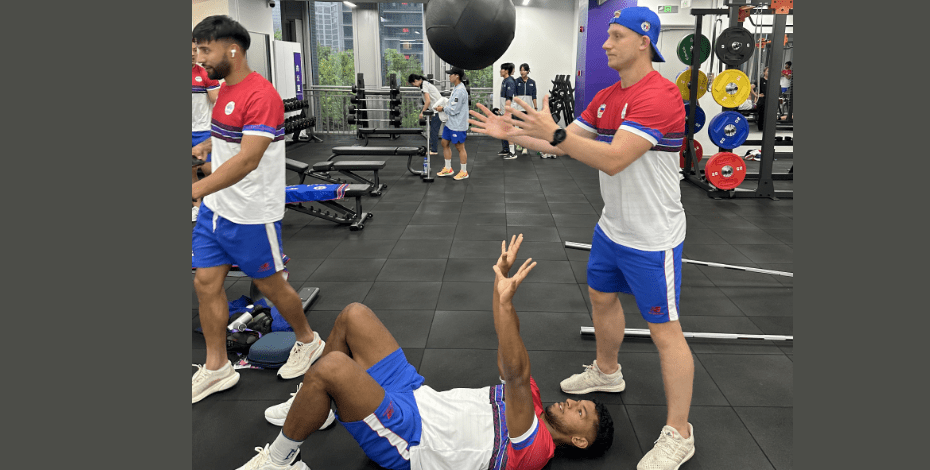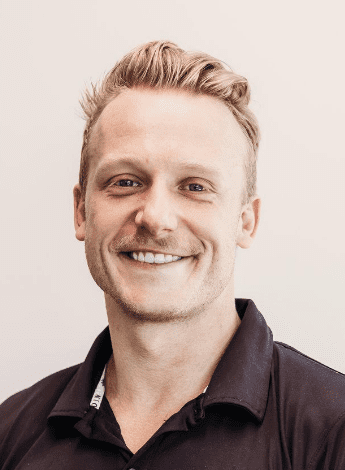
Treating through lived experience

AUSTRALIAN COLLEGE OF PHYSIOTHERAPISTS Reece Jones’ experiences with sports and injury have informed the way he serves his patients and recently he has built upon his skills by completing the titling experiential pathway.
Sport has always been part of Reece Jones MACP’s life.
The Titled Member of the Australian College of Physiotherapists credits his own sporting experiences, including recovery from multiple injuries (two ACL reconstructions, six shoulder dislocations, one shoulder reconstruction and one hand reconstruction), in shaping the way he assesses and treats patients.
‘I do love my sport; I’ve played sport my entire life.
'It is fair to say I have had my own share of injuries through the years, so I can understand and empathise with what a person is going through when they are hurt and moving through rehabilitation.’
Reece has recently been awarded an APA Sports and Exercise Physiotherapist title, after completing the titling experiential pathway.
He says the titling pathway has provided him with an opportunity to deepen his knowledge and skills ‘to identify, assess and treat sports injuries’.
‘As far as choosing to undertake the titling credential via the experiential pathway is concerned, personally I feel that on-field physiotherapy in sports is similar to working in emergency care.
'You have injuries that are often quite traumatic and this requires a deep understanding of anatomy and pathology and using the correct assessment techniques at a much higher level than what is taught at university.’
He has operated his own private practice, Set in Motion Physiotherapy, for the past seven years, with clinics in Frenchs Forest and Macquarie Park.
The latter clinic operates in collaboration with a private standalone emergency department known as WiSE (Walk-in Specialist Emergency Clinic).
‘WiSE is a unique concept on its own.
'A large portion of patients are referred in-house from the emergency department to our physiotherapy staff and we treat acute trauma injuries such as ankle fractures and sprains and patella dislocations as well as finger fractures and muscle tears.’
He says providing people with access to physiotherapy in an emergency department boosts patient outcomes and acts as a bridge to community services that improve mobility and overall physical functioning.
‘The importance of this has been shown in research.
'I work day in and day out with emergency consultants but—due to the level of risk—I felt that titling would help me develop the skills and knowledge I need to work at a higher level of competency.’
This includes continuing to support elite athletes and sporting teams.
For the past two years, Reece has worked with the Philippines National Rugby Sevens Team as head of medical and head of strength and conditioning.
‘This has given me the opportunity to travel to the Philippines, China and Thailand as well as experience one of the biggest multi-sport events, the Asian Games.’
His experience with physiotherapists when he was a teenager playing sport helped Reece decide on a career.
‘Sport was all I knew as a child and teenager.
'When I was 17, I suffered a scapholunate fracture and dislocation of my wrist and I couldn’t play sport for six months.
'About one year later, I suffered an ACL injury and this required 12 months off from sport. I then returned to sport, only to reinjure my ACL in my third game back.

Reece Jones.
‘Going through these injuries left a lasting impression of the significant role a physiotherapist can have when supporting a person through rehabilitation.
'I understood the importance of person-centred care very early on.’
Reece graduated from Australian Catholic University with a Bachelor of Exercise and Sports Science degree in 2013.
Two years later, he completed the Master of Physiotherapy degree at the University of Sydney.
His passion for musculoskeletal physiotherapy and hand therapy was sparked when he was accepted into a graduate program at the Royal North Shore Hospital in 2016.
He spent two years with the hospital, with one year in the specialised hand therapy unit, before moving on to work in private practice.
‘That was when I decided to open my own private practice as I really enjoyed supporting the individual through the entire recovery process.
'My time at the hospital enabled me to gain invaluable experience from senior physiotherapists and orthopaedic surgeons; I built on that when I started working in private practice.
'Being willing to learn from other professionals is crucial.’
Reece has found that the titling pathway offers many benefits.
He recommends the pathway to clinicians who are confident in their skills and who have four to five years of experience.
‘It has made me a better physiotherapist by developing and refining my skills in assessment and treatment.
'Financially, it makes much more sense than going back to university and it allowed me to continue to work in and run a physiotherapy practice.
‘I’ve been able to translate the knowledge that I have built upon in the titling pathway into our practice.
'For example, our Achilles and patella tendinopathy patients now have access to well-structured education links on our website and rehab programs that are far more structured than they used to be.’
When he is not in clinic, Reece competes in triathlons and plays touch football; he is also currently training for a half Ironman.
However, his next work goals are to complete a second-hand therapy course and achieve the title of hand therapist early next year.
His focus and determination, he says, come from early lessons.
‘I worked my bum off to get into physio as I didn’t go through direct entry.
'When I think back to that injured 17-year-old today, I would say, “Listen to your physio”.
'At 17, I thought I was invincible. I did my rehab but not as well as I should have so I injured myself straight away.
'I learnt that an important part of the physiotherapist’s job is making sure the patient understands how important rehab is; knowing how to get a message through to the patient is an invaluable skill.’
Find out more at here or email acp@australian.physio.
© Copyright 2025 by Australian Physiotherapy Association. All rights reserved.





